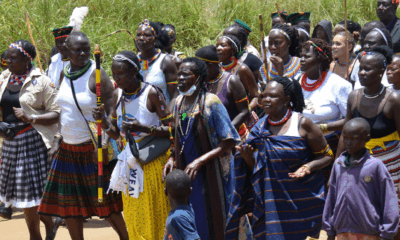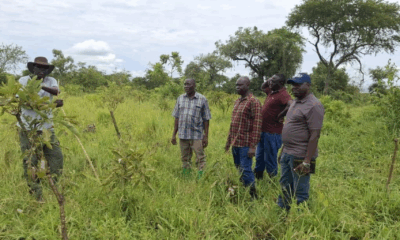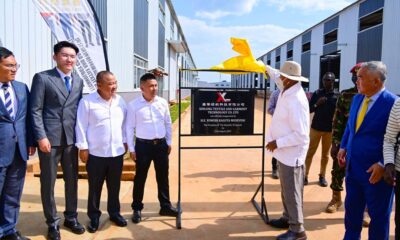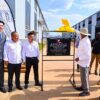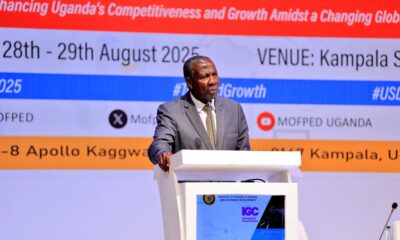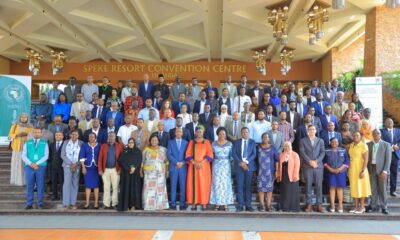Economy
Uganda Eyes $500 Billion Economy: Capital Markets Authority Pushes for Alternative Investment Revolution
Uganda has unveiled an ambitious economic transformation plan that aims to catapult the country’s GDP from its current US$63 billion to US$500 billion within the next 15 years. But achieving this monumental leap will require more than traditional financing — it will demand a radical shift toward alternative investment models, according to the Capital Markets Authority (CMA).
The bold vision was presented during the 3rd Alternative Investment Conference held in Kampala on Wednesday, under the theme “Advancing Private Sector Leadership in Climate Finance Mobilisation.” The event brought together key stakeholders in finance, development, and government, and was officially opened by Bank of Uganda Governor, Mr. Michael Atingi-Ego.
Representing CMA CEO Josephine Okuyu Ossiya, Mr. Ssembuya Magulu, the Authority’s Director of Research and Market Development, delivered a powerful message: Uganda’s economic breakthrough cannot rely solely on traditional finance. “The road to a US$500Bn economy will not be paved by traditional finance alone. Alternative investments are the missing link—the catalyst for transformative growth,” Magulu emphasized.
According to Magulu, Uganda must fully embrace private capital, venture capital, private equity, and impact investing to unlock its economic potential. The CMA sees these tools as critical to channeling the vast resources needed to develop Uganda’s priority growth sectors.
He identified four pillars of transformation where alternative investments must be strategically directed: Agro-industrialization – Shifting from raw agricultural exports to high-value processing and agro-industrial hubs. Tourism – Expanding eco-tourism and cultural tourism, while improving hospitality infrastructure. Mining, Oil, and Gas – Ensuring sustainable extraction, local value addition, and community benefit from Uganda’s natural resources. Technology and Innovation – Fostering growth in fintech, digital platforms, and smart infrastructure for a knowledge-based economy.
Magulu detailed how the CMA is already working to position Uganda as an attractive destination for global alternative capital, focusing on several key areas:
Scaling Business Development Services,
Through partnerships such as the European Union’s Deal Flow Facility, the CMA is equipping local enterprises with the technical support needed to become “investor-ready,” bridging the gap between promising ideas and bankable ventures
Advancing Regulatory Reforms
The Authority is actively updating Uganda’s capital markets regulatory framework to accommodate more flexible capital-raising mechanisms, foster private asset trading, and build liquidity and confidence in alternative asset classes.
Finalising Sustainable Finance Frameworks
Magulu also revealed that Uganda’s Green, Social, and Sustainability-linked Finance Framework is near completion. The framework will align with global ESG (Environmental, Social, and Governance) standards, allowing Uganda to attract climate-conscious investors and access international capital pools dedicated to sustainable development.
The conference reinforced the CMA’s commitment to a multi-stakeholder approach in building an inclusive investment ecosystem. Partnerships with policymakers, institutional investors, entrepreneurs, and international agencies are seen as key to unlocking Uganda’s full economic potential. “Achieving this vision requires collective commitment. The private sector must lead in mobilising patient and productive capital. But it will take coordinated reforms, innovation, and trust across the board,” Magulu said.
Uganda’s aspiration to grow its economy nearly eightfold by 2040 is one of the most ambitious targets ever set by a Sub-Saharan African nation. While critics may question the feasibility of such a bold move, the CMA argues that with the right financial tools, regulatory infrastructure, and a private sector empowered to lead, this goal is within reach.
The message from the 3rd Alternative Investment Conference was clear: the age of conventional development finance is giving way to a more dynamic, diverse, and impact-driven capital environment. And Uganda intends to be at the forefront of this evolution.
Comments






